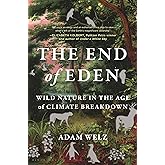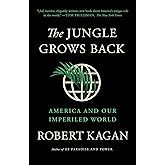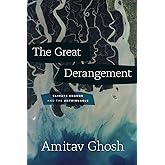
Download the free Kindle app and start reading Kindle books instantly on your smartphone, tablet, or computer - no Kindle device required.
Read instantly on your browser with Kindle for Web.
Using your mobile phone camera - scan the code below and download the Kindle app.

The Devouring Dragon: How China's Rise Threatens Our Natural World Hardcover – March 12, 2013
China's rise is assaulting the natural world at an alarming rate. In a few short years, China has become the planet's largest market for endangered wildlife, its top importer of tropical trees, and its biggest emitter of greenhouse gases. Its rapid economic growth has driven up the world's very metabolism: in Brazil, farmers clear large swaths of the Amazon to plant soybeans; Indian poachers hunt tigers and elephants to feed Chinese demand; in the United States, clouds of mercury and ozone drift earthward after trans-Pacific jet-stream journeys. Craig Simons' The Devouring Dragon looks at how an ascending China has rapidly surpassed the U.S. and Europe as the planet's worst-polluting superpower. It argues that China's most important 21st-century legacy will be determined not by jobs, corporate profits, or political alliances, but by how quickly its growth degrades the global environment and whether it can stem the damage. Combining in-depth reporting with wide-ranging interviews and scientific research, The Devouring Dragon shines a spotlight on how China has put our planet's forests, wildlife, oceans, and climate in jeopardy, multiplying the risks for everyone in our burgeoning, increasingly busy world.
- Print length304 pages
- LanguageEnglish
- PublisherSt. Martin's Press
- Publication dateMarch 12, 2013
- Dimensions6.4 x 1 x 9.5 inches
- ISBN-100312581769
- ISBN-13978-0312581763
Book recommendations, author interviews, editors' picks, and more. Read it now.
Frequently purchased items with fast delivery
Editorial Reviews
From Booklist
Review
“From the coal mines of Colorado to the forests of Papua New Guinea, and all over China in between, Craig Simons illustrates from the ground up how the Middle Kingdom's economic takeoff is upending the planet at the very moment it is reaching an environmental tipping point. The book is both a gripping grassroots narrative of economic development as well as a heartfelt plea for the future.” ―Richard McGregor, author of The Party and Washington Bureau chief for the Financial Times
“China's insatiable appetite for resources has raised the world's metabolism in ways that you could never imagine. Craig Simons' Devouring Dragon takes you clear across the globe--from the ghost town of Trinidad, Colo., to a jungle in Papua New Guinea to the world's largest dam on the Yangtze River -- as he tells the fascinating story of the world's interconnectedness. This is the most important book about the environment in years, scary, riveting and packed with insight into how the world's resources are exploited for economic growth.” ―Barbara Demick, author of Nothing to Envy: Ordinary Lives in North Korea and Logavina Street: Life and Death in a Sarajevo Neighborhood
“In The Devouring Dragon, Craig Simons gives a lucid portrayal of the ways in which the world is being changed by China's rise. The science and the statistics are sobering, but so are the human faces behind the numbers as Simons writes with deep sympathy for people struggling to overcome poverty and isolation: the New Guinean who longs to travel, the Chinese farm family who, despite being careful consumers, are part of a massive transformation that threatens to throw the world out of balance.” ―Peter Hessler, author of River Town: Two Years on the Yangtze, Country Driving: A Chinese Road Trip and Oracle Bones: A Journey Through Time in China
“Simons paints a devastating picture of the global consequences of China's relentless and rapacious growth, from the clear-cutting of the earth's last stands of exotic hardwoods to the extinction of major animal species, from coal dust that reaches Oregon to the crippling pollution that swaddles China's cities. China's rise, as Simons shows, has raised hundreds of millions of its people out of poverty; the cost, environmentally and ecologically, has been calamitous for the planet.” ―Edward A. Gargan, author of The River's Tale: A Year on the Mekong
“The Devouring Dragon offers a wide-ranging, carefully researched, and ultimately chilling account of China's impact on global biodiversity and climate change. Craig Simons journeys around the world to speak to illegal loggers, biologists tracking species extinction, and a panoply of Chinese -- whose appetite for resources and a higher standard of living is catalyzing a planetary environmental crisis. By turns diverting and personal, informative and thoughtful, this book serves as an urgent call for all of us to change our patterns of consumption before it is too late.” ―Judith Shapiro, author of China's Environmental Challenges and Mao's War against Nature
“A compelling and superbly written account of China's massive environmental impact around the globe. A must read for any thoughtful citizen, The Devouring Dragon portrays the choice before humanity: a headlong rush to a highly degraded planet OR a truly sustainable path that respects the wondrous living planet and its promise for all.” ―Thomas E. Lovejoy, University Professor of Environmental Science and Policy George Mason University Biodiversity Chair The Heinz Center for Science, Economics and the Environment
“From Papua New Guinea to Trinidad, USA, Simons goes further than anyone before him in tracing the impact of China's rise on the global environment. Adroitly blending science and theory with personal stories and on-the-road reportage, this book vividly describes the risks posed by climate change and biodiversity loss as Chinese consumers follow the unsustainable path set by their counterparts in the West. The author does not flinch from grim stories, but neither is he overwhelmed by them. This book ends with an optimistic message of empowerment and change.” ―Jonathan Watts, author of When a Billion Chinese Jump
About the Author
Craig Simons has reported on the environment from a dozen Asian nations for Newsweek and Cox Newspapers. He has also written for Outside, Backpacker, The New York Times, and The Wall Street Journal. He studied at Harvard University, The University of Pennsylvania, and―as a Knight Science Journalism Fellow―MIT.
Product details
- Publisher : St. Martin's Press
- Publication date : March 12, 2013
- Language : English
- Print length : 304 pages
- ISBN-10 : 0312581769
- ISBN-13 : 978-0312581763
- Item Weight : 1.06 pounds
- Dimensions : 6.4 x 1 x 9.5 inches
- Best Sellers Rank: #8,409,654 in Books (See Top 100 in Books)
- #4,350 in Chinese History (Books)
- #6,022 in Environmentalism
- #8,854 in Nature Conservation
- Customer Reviews:
About the author

Discover more of the author’s books, see similar authors, read book recommendations and more.
Customer reviews
Customer Reviews, including Product Star Ratings help customers to learn more about the product and decide whether it is the right product for them.
To calculate the overall star rating and percentage breakdown by star, we don’t use a simple average. Instead, our system considers things like how recent a review is and if the reviewer bought the item on Amazon. It also analyzed reviews to verify trustworthiness.
Learn more how customers reviews work on AmazonTop reviews from the United States
There was a problem filtering reviews. Please reload the page.
- Reviewed in the United States on June 6, 2013The book was excellent at explaining the present dangers that the world experiences and the future action to take to avoid devastation of our Planet Earth. Devouring Dragon is the perfect title for the contents. The author's wide experience of visits to so many different places, his PCV experience, his work as a journalist, his avid interest in nature, his ability and energy to get to meet and discuss with so many different people, and his expertise in writing has made this book a great read to say the least. I really appreciate the positive attitude throughout the narrative and I also appreciate the candid truth that mentions that China is only following what America has already done. It is so essential that both the U.S. and China must work on the forefront to help people to realize the need to do even the smallest things in their daily lives to help the planet and stop harming it. Great book and kudos to the author!
- Reviewed in the United States on August 10, 2013Mr. Simons' title says it all. He has a conclusion and sets out to prove it. If you like to beat up on an easy target in the blame game of who is responsible for environmental degradation then you will enjoy this book. What is lacking is the intellectual rigor that recognizes there are is argument that is as one-sided as this one. Mr. Simons is riding a popular horse called: blame the Chinese. The Chinese deserve a lot of blame. It has taken China too long to recognize the damage 8-10% growth for 30 years to do to the environment not only in China but also many other parts of the world. But there are environmental movement underway in China. NGOs once shunned now proliferate. The government spends increasing amounts of money and political effort into finding a balance between necessary growth and reduced environmental cost. Little of these efforts are explored in this finger pointing book.
- Reviewed in the United States on July 28, 2013My son, James Burnham, is a researcher who goes to China a couple of times a year doing research for his PhD. He met the author of this book, Craig Simmons. James and Craig are former Peace Corps volunteers. Craig looked James up because of his research at Lake Poyang in southeastern China with the Siberian cranes. This book is very truthful and very current. The Epilogue has Craig's observations of James at Lake Poyang. That is the main reason I bought the book. It turned out to be quite an interesting book on the subject of China and the attitude of China towards the environment.
- Reviewed in the United States on November 8, 2013Those in any Western nation unaware of Chinese investments and incredible growth curve must be blind and deaf and oblivious to any financial or world news. Craig Simons as a former peace corps volunteer must certainly be gratified to see the desperately poor millions of China now rise up slowly to a better standard of housing, food, transport and education. He documents their incredible breakneck progress since the 1990's and their almost insatiable need for coal, raw materials, land and mineral wealth. The average peasant is crawling pretty quickly out of his or her rice paddy, able to buy machines and build better homes, send sons to school or even college, travel to nearby towns regularly, send daughters to work in gigantic city factories, buy heaters, TV's, radio's and microwave ovens. They have electricity fueled by China's huge coal deposits. What had Lenin said about Russia and what literacy plus electricity could do for it?
Yet rejoice he does not. All this progress upsets and dismays him, for it leads inevitably to horrendous pollution. He lives in Beijing in the midst of this devouring dragon as he calls China. He sees the horrid air and water pollution, extinction of species such as the giant sturgeon and tigers, and sees the filth fall right into the pages of the book he is reading. China is endangering lands around the world and the future of all the earth's resources. It is a frightening story. Is there any way out if billions are not to perish by famine or disease or revolution or war, as often happened in China? Must we all go back to very simple, simple and desperate ways of living, with acute heat and cold in our homes? Is it the only way to save the earth, by stopping the rise of the Third World, especially China's 1.4 billion, from taking more and more resources? These questions lay heavy in the mind of our writer, Craig Simons. He has researched in depth and on site a shocking story of destruction by Chinese industrial expansion, and its roots in Chairman Mao's anti-nature materialism and big-family policies.
The natural materialism of the human race may be our global undoing and no one can claim immunity. But there is something doubly fierce in the Chinese mentality. Greed and the love of money go with them anywhere in the world they emigrate. Hard work, determination, intelligence and longterm planning are all their strong points. One can admire this or fear it but it certainly suits the American historical mindset to consider the successful the most important and respected. We see the universities of USA, Canada and Australia filled with Chinese ethnic students, both homegrown or paying big tuition from abroad. Their younger siblings come to our best prep schools at 14. There is no doubt that they can and will be the rulers of tomorrow in every country in which they take hold.
In the case of the Chinese it is also a racist and nationalistic view. They wanted to be admired or even feared but not loved. They want to be rich and their goals are easily discernible even in the most petty of interactions. Here in San Francisco with forty percent Chinese ethnics? We know that money is their prime motivation. Jokes and poems all the way back to the Gold Rush years incorporate their love of money as their way of overcoming obstacles. "BEND NOT BREAK", another new Chinese-immigrant success story, is a perfect book to read to understand how a person with little money can rise up so high if she is determined enough, even if marrying a Caucasian is the only ladder to success.
But does our author explore this aspect of the Chinese culture? Can it be taboo in his own mind if he is very enmeshed in the Chinese everyday life? If his wife and child are Chinese, he cannot openly insult the very roots of the culture's behavioral characteristics. Besides, if all gung-ho practices lead to success, who but the self-consciously Western analytical environmentalists will bring up these ideas in the discussion? Burma has now allowed about 5 million Chinese to move in and to start using Burmese resources. Their prosperity, their new shops and homes and mentality, bely the more complacent, predominantly Buddhist way of life. Burmese Bamas (native bloods, the grand majority) object to this influx, but the government needs the money and development. In Africa, especially Angola and Mozambique, the Chinese are buying land and developing crops for their own peoples. Millions are moving there from China. Native Africans have no say in this mass migration and change in their culture. Natives nowhere have a choice, unless as in the days of old, African natives used their machete knives and spears to attack and kill the white missionaries and governmental workers; or if native American tribes drove out settlers with slaughter, scalping, burning properties and so on.
Here is one important detail for China watchers, on page 199: Zhang Dejun, 64, and his wife, age unknown, are two peasants whose energy and money expenses were analyzed. They only spent $1/month on electricity (4 bulbs in the house and using wood for heating/cooking), $5 on telephone bills (cellphone), and lived off his $800/month selling of grain and vegetables. BUT the male Zhang spent $15/month on cigarettes!!! (50-cent pack, 2 days each) $8/month is spent on baijiu, the male's grain alcohol, every day. The females abstain, so we are told.
So there you have it folks: no matter their success, their men are condemned to nicotine addiction and horrific diseases bringing early death. Is it another government plot to kill them off before they get too old, or is it inbred in the male culture, or were the cigarettes introduced in the 1920's by American companies a good replacement for opium use?
EATING FRIED RICE WITH CHOPSTICKS is another book for China-watchers. Read how it is to travel there independently as a non-Chinese female.
In sum, I know that Craig Simons is very badly broken up about China's rise, but if it were not happening,a nd the dreadful misery of the Mao years and ancient ways of living were still in place, wouldn't there be books bemoaning the sad state of the millions there? Yes, those books were written, by missionaries mainly. Alice Tisdale Hobart wrote OIL FOR THE LAMPS OF CHINA about her life there with Standard Oil in the 1920's.
All we can do is simply stop buying from China, but good luck with that!
- Reviewed in the United States on January 28, 2014Read this book. You must read this book. A lot of research went into writing it and everyone needs to be aware of what is going on so intelligent decisions and discussions can occur.
Top reviews from other countries
 Kindle CustomerReviewed in the United Kingdom on October 10, 2018
Kindle CustomerReviewed in the United Kingdom on October 10, 20185.0 out of 5 stars A good read.
Interesting but scary "resume" of China's global effect.
-
 洋書の友Reviewed in Japan on January 21, 2015
洋書の友Reviewed in Japan on January 21, 20153.0 out of 5 stars ドギツイ表題からどぎつい暴露本かと思いきや!!
表題は「緑の自然を食い尽くす中華帝国という化け物!」くらいか。環境破壊の親玉・中国の暴露・告発本かと読み始めたら、実際はグリーンなアメリカ人ジャーナリストのグリーンな行儀のよい警告の書でした。著者はもう十年も中国に住み、活動しているフリーのジャーナリスト。中国の急速な経済発展が自国内ばかりか世界規模で引き起こしている環境破壊を揚子江イルカ絶滅や丹頂鶴、インドのトラ、東南アジア、ニューギニアの森林伐採を通して検証してゆく。政治的には中国政府の国際環境活動に対する非協力的態度にも触れる。残念ながら、取材は現地に足を運んでいるものの、表面だけを見たり、聞いたりしている物足りなさが残る。グリーンなお説教は耳にタコ。ジャーナリストなら取り上げた漢方薬・密漁・違法伐採・違法操業工場などにもっと食い込んで、深い取材をして欲しい。母国アメリカが何とか中国に影響力を行使してくれなどとは甘い!!!垂れ流しの公害、汚水、毒物で広汎な被害者が将来的に出て、中国各地で反政府暴動が頻発するまで、中国共産党政府の身勝手な行動は止むことはないのではないか。食い込みとアクドサの欠如で2星減。
 Tommaso SaviniReviewed in the United Kingdom on June 19, 2015
Tommaso SaviniReviewed in the United Kingdom on June 19, 20155.0 out of 5 stars Five Stars
Good quality product














